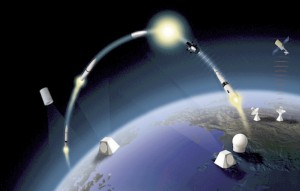 Helping Europe with missile defense would show Russia that the U.S. is serious. The U.S. needs to show that Putin’s ambition will be checked.
Helping Europe with missile defense would show Russia that the U.S. is serious. The U.S. needs to show that Putin’s ambition will be checked.
by Peter Roff
The world – as events in Iraq remind us – remains a dangerous place. The Russians are flexing their muscles while President Vladimir Putin tries to reassemble as much of the old Soviet Union as he can. The Chinese are trying to expand their territorial waters in Asia. North Korea apparently has the bomb while Iran wants one – badly.
In short, this is no time for the United States to step aside from its role as leader of the free world. As Franklin Roosevelt observed, America is “the arsenal of democracy,” making the weapons the rest of the world needs to secure their own defenses. Plans for downsizing the Pentagon until the U.S. military is at its smallest since before the surprise Japanese attack on Pearl Harbor places the nation and her allies at risk, especially from another surprise attack coming from an unexpected quarter.
Judging by the billions of dollars that have been cut from key systems, the Obama administration has never made missile defense a priority even though, as was proven in the first Gulf War, it provides substantial bang for the buck. A robust defensive shield able to shoot down ballistic missiles fired by a hostile power or terrorist organization could prevent a disaster of catastrophic proportion. To put it another way, spend millions on missile defense now or billions or trillions to clean up the wreckage of a once great city later, or, in the case a high-altitude burst producing an electromagnetic pulse – EMP for short – the end of the United States as we know it.
The same is true for Europe, where the threat of missiles coming from the east or southeast is as dangerous to its great capital cities as a volley fired from Cuba or Venezuela might be to us. Credit to the Poles for going it almost alone after Obama unilaterally canceled a Bush-era agreement for a tri-partite missile defense that would have placed facilities in Poland and the Czech Republic. Their announced “Polish Shield” will be a vital part of checking Russian aggression throughout Europe and significantly decrease the chance that she might be dismembered or occupied for a third time in a single century.
The rest of Europe needs to follow suit. Their reluctance, for both political and financial reasons, to make the commitments necessary to keeping Putin and the Russian military in its place could be alleviated to some degree by strong leadership coming from Washington. The $1 billion recently announced to help our allies step up their own security is a good start, but a more formal partnership is needed to build and put in place significantly more next-generation Patriot missile batteries and other deterrents that could stop a single missile coming from Syria or Iran. Doing so would also reduce Putin’s ability to engage in theater nuclear blackmail.
Europe needs a smart defense option. Increasing the number of Patriots deployed through the continent is a sensible starting place because it would permit the European community to build up what has already been done in cooperation with five NATO partners.
The fact that the Patriot is ready now, has been tested and proven to work in actual combat situations – and in more than 1,000 flight tests under real world conditions – makes it really the only option, which is probably why the Poles are considering it as the basis for their own defensive system. And the Patriot, by contrast, is a far more viable option than the pie-in-the-sky plans for sophisticated systems that are at least a decade away from being ready for deployment. As the headlines remind us daily, the free and developed world may simply not have that much time.
There are other technologies that need to be integrated into a “smart Europe” defense system. The Patriot missile, because it is well known to people in the United States from the role it played in the first Gulf War shooting down Iraqi missiles fired at Israel, would likely be the best “first option.” Congress could support spending the funds to expand the range of global missile defense with confidence, especially considering when the costs for engineering and modernization would be spread among European allies who are or could become partners, as is the case with Patriot. This makes increasing security more affordable for all involved, including the U.S.
The United States needs to lead, to show the world that Putin’s ambition to reconquer territory lost at the end of the Cold War – under a fig leaf of democratic-seeming referenda and other duplicitous schemes – can and will be checked. Talking is good. Building up the defenses of “fortress Europe” is even better because it would show – as it did under Ronald Reagan when the U.S. persuaded our allies to permit the installation of intermediate range nuclear weapons to counter what the Soviets had done in the areas they controlled – that America is serious about the preservation of freedom and democracy.
Or, to put it another way, that since there’s a bear loose in the woods once again, that we intend to be just as strong as that bear until we know its intentions.
. . . . . . . . . . . . . . . . . . . . .
Peter Roff is a contributing editor at U.S. News & World Report. Formerly a senior political writer for United Press International, he’s now affiliated with several public policy organizations including Let Freedom Ring and Frontiers of Freedom.